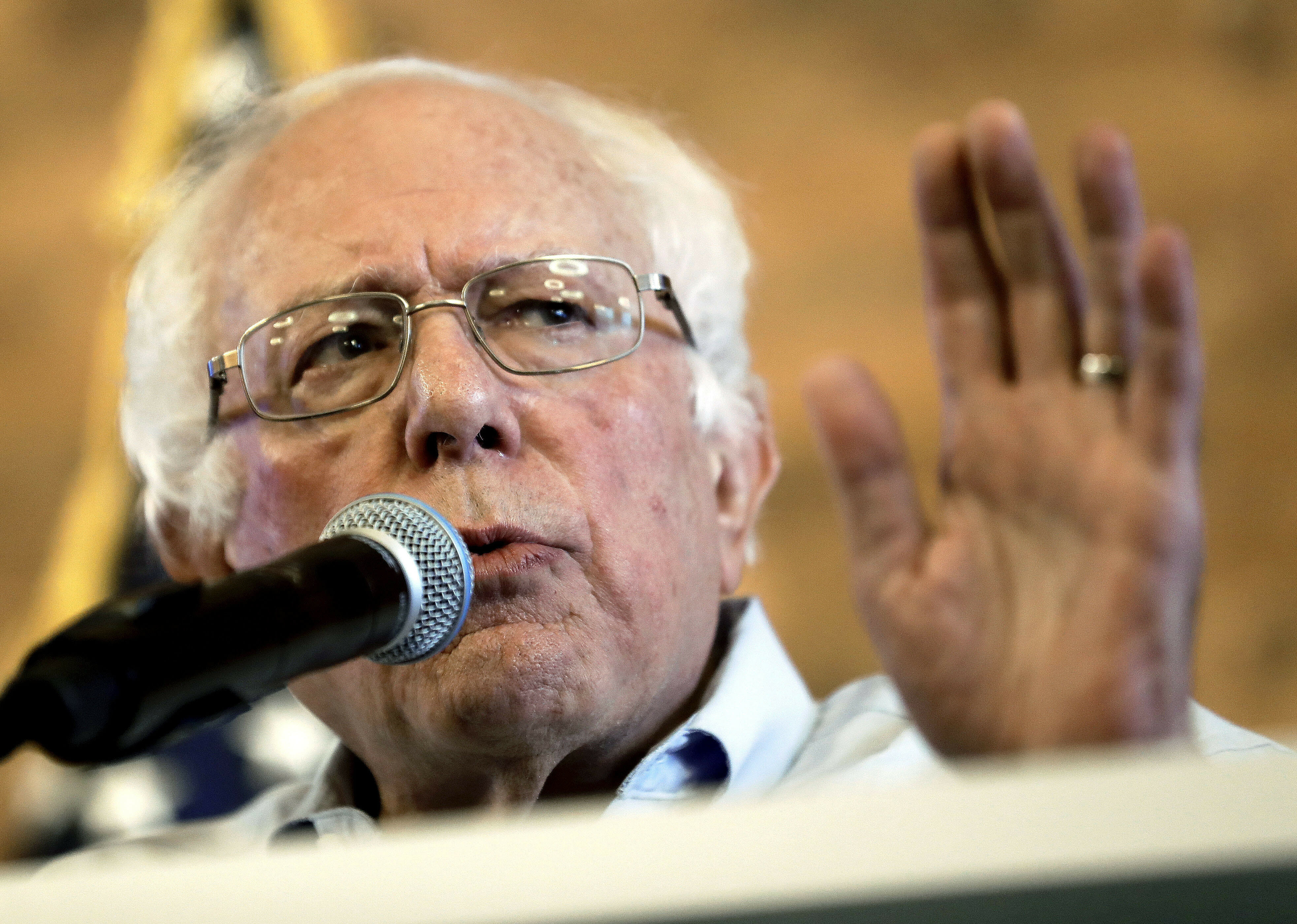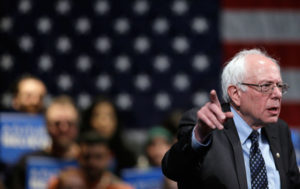Is Sanders Enough of a Socialist?
Progressives are continuing to define what modern socialism is and what it should be. Sen. Bernie Sanders: "So what democratic socialism means to me is having, in a civilized society, the understanding that we can make sure that all of our people live in security and in dignity." (Chris O'Meara / AP)
Sen. Bernie Sanders: "So what democratic socialism means to me is having, in a civilized society, the understanding that we can make sure that all of our people live in security and in dignity." (Chris O'Meara / AP)
The following is a conversation among activists Jacqueline Luqman, Eugene Puryear and Norman Solomon and The Real News Network’s Paul Jay. Read a transcript of their conversation below or watch the video at the bottom of the post.
PAUL JAY: Welcome to The Real News Network, I’m Paul Jay.
Well, Donald Trump has framed the 2020 elections as a fight between socialism and capitalism. Here’s what he had to say at the State of the Union.
DONALD TRUMP: Here in the United States, we are alarmed by the new calls to adopt Socialism in our country. America was founded on liberty and independence, and not government coercion, domination, and control. We are born free and we will stay free. Tonight, we renew our resolve that America will never be a socialist country.
PAUL JAY: Now, I suppose a lot of people like me, when I watch the State of the Union, it’s not so much about what the president says, it’s more the applause-o-meter. Who is getting up to applaud when? And you try to read the politics of the room. And as he was saying “America will never be a socialist country,” there’s Nancy Pelosi behind him, applauding. At any rate, a town hall held by Bernie Sanders, or with Bernie Sanders, on CNN just a few days ago, Bernie Sanders was asked about socialism, and here’s what he had to say.
SPEAKER: Senator Sanders, can you make a simple, persuasive case as to why socialism is preferable to capitalism?
BERNIE SANDERS: Democratic socialism, right?
SPEAKER: Yes.
BERNIE SANDERS: OK. Let me tell you what I mean by that so we’re clear. Right now, we have a nation which prides itself on a lot of political rights. In other words, under the Constitution, thank God, you have freedom of speech, media can do its thing, even though Trump calls you an enemy of the people. How does it feel to be an enemy? That’s another story. All right.
SPEAKER: You don’t think we are.
BERNIE SANDERS: No, I don’t. I certainly do not. So we have freedom of religion, and all of that is enormously important. But you know what we don’t have? We don’t have guarantees regarding economic rights. And way back in 1944, in a little known, a little publicized State of the Union speech, Franklin Delano Roosevelt said something. And I’m paraphrasing him, but he said when we talk about human freedom and rights, we’ve got to understand that everybody needs a decent paying job, that people need healthcare, that people need education. And all over the world, these ideas are taking place. You go to countries in Scandinavia, of course healthcare is a right, higher education is free. They have strong preschool programs. They make sure that their elderly folks can retire in dignity.
These are not radical ideas. So what democratic socialism means to me is having, in a civilized society, the understanding that we can make sure that all of our people live in security and in dignity. Healthcare is a human right. All people should have healthcare. You can’t get ahead in this country, in this world, unless you have a decent education. We have got to, as a right, end the kinds of discrimination, the racism and the sexism and the homophobia that exist. So to me, when I talk about Democratic socialism, what I talk about are human rights and economic rights.
PAUL JAY: Eugene, what do you think?
EUGENE PURYEAR: Well, I have to say, this is one of the areas I’m most critical of Bernie. I mean, I think that he’s defining as socialism is really just a New Deal, Great Society liberalism, which certainly is good as far as it goes, it’s certainly much better than the unrealized dreams of those eras. It’s certainly a much better state of affairs than what we have now. But I think he was unable to really hit the core of the difference between capitalism and socialism and the idea that capitalism is a system where everything is produced for profit to be a commodity, and socialism is a system where the basic goods that people need to live, survive, and thrive are also not commodities. And certainly, he mentions healthcare, education, and things of that nature, but what about clothing, what about food, what about shelter?
And I think above and beyond anything else, I think also it’s to me a little bit of a naive presentation from the point of view of sort of the U.S. political structure which enshrines, in and of itself, and this is certainly the contravention of what Trump was saying, of course, property above all other interests. Certainly, that was rooted in the slave system, and the control of land that resulted in slavery and the genocide of Native Americans, that ultimately, what do you do in this kind of context in the United States when say the Fifth Amendment, for instance, comes up against the desire to be able to decarbonize the economy? I mean, it says that you can’t take property without paying people for it. Well, if the health of the planet is at stake and the cost is too high, well what are you going to do? Are you going to take over and shut down all the oil companies and save the planet or are you going to go with the U.S. Constitution?
So I think the reality is is perhaps what Bernie is portraying is as much as you can do within the U.S. system, but I think it’s not actually socialism. And I think that that is in and of itself an important distinction that I think has to be made here, that socialism is a system where profit is never going to be able to succeed over the needs of people. And I think that goes beyond what he was willing to say, despite the fact that certainly, all the things he’s saying I think, would be good and should be instituted right away. And there’s actually really almost no reason why all of them couldn’t be instituted tomorrow except for a lack of political will.
PAUL JAY: Jacqueline, how do you balance this, what’s possible within the current American political system and politics versus perhaps what actual socialism is?
JACQUELINE LUQMAN: Well, when you have a current political system in which Citizens United has declared that that corporations are people so now corporations and the heads of corporations have more say in the political system than the people the political system is supposed to represent, there’s no balancing that. I mean, that system needs to be changed.
So there is no way to really reconcile this idea that America is never going to be a socialist nation in a chamber in which so many of the politicians are standing up and cheering because they’re cheering for the fact that they were going to fight to maintain the benefits they get from private interests, from the interests of private corporations that make and keep them rich. And if that means the rest of us who they are supposed to represent in that chamber get nothing and that we have to give every dime we make, if we can even get a job, to maintain this unjust predatory capitalistic system, they will do it even if they are standing there lying about this threat of socialism that really is not even a threat in this country and never really has been, but the threat of socialism taking over the United States government is as old as what 1927, 28. So this isn’t even a new argument we’re having here in our government.
PAUL JAY: Norm?
NORMAN SOLOMON: We can argue, and we need to keep talking about what socialism is, what it should be. When Francois Mitterrand became president of France, he became president as the standard bearer of the Socialist Party back in the early 80s. I mean, they call themselves socialist, that wasn’t socialism. And we’ve seen the result of that kind of bogus claim to socialism in Eastern Europe and the Soviet Union. We were told that was socialism. When you throw people in jail for expressing themselves, that’s not socialism, economic rights are part of it and political rights are part of it, human rights, as Bernie said, has to be central to socialism. I think from the very first words of his response to what in our political context in the U.S. is a loaded context, he asked by the questioner, “Do you support socialism?” And he said, “democratic socialism.” Unlike what is sometimes done in print media, that’s lowercase d democratic socialism. And I think, given the history of the last hundred years, it’s absolutely excellent to emphasize democracy as being essential component of socialism.
So I really believe that Bernie’s few minutes there, given the question and that he had two or three minutes, I think it’s a terrific answer. And we can be as theoretical as we want, we can argue about history, we can argue about the future, we can say we want to get from here to there in the next week. I would love that we would have socialism yesterday. We’re in the real world. We’ve got our feet on the ground, our eyes on the horizon, which should be, I believe, democratic socialism. And one of the best retorts, I think, to the baiting that mass media are already engaged in, not only the right wing but much of the mass media towards Bernie about being a democratic socialist, is to refer to the fact that in the 1930s, the trade union movement that helped bring us Social Security, that program was denounced as socialist. In the 1960s, the fight for Medicare, that was denounced as socialist. So as time goes on, I’m less and less interested in the theoretical arguments and more and more fascinated with the real, on the ground potential to transform this country in the way that Bernie Sanders is describing.
PAUL JAY: Yeah, I don’t think we should underestimate how powerful those cold war years were. The House of Unamerican Activities Committee, McCarthyism, how it transformed what was taught in the schools. You’d go at kindergarten, you’d put your hand on your heart and you’d pledge allegiance to the flag, essentially the flag of the Cold War and the rise of imperialist interventions. I think Bernie, and to some extent to give some credit to Occupy too, but the extent to which Bernie has allowed socialism to be in the discourse in a very positive way, even if it isn’t what some of us might consider actual socialism, that being said, and I give Bernie tons of credit for that, and not just Bernie, but the whole movement that gave rise to Bernie has arisen. And it’s not just Bernie anymore, there’s lots of such candidates. That being said, I think again, there’s a way he could be going further than he is without stepping so outside the bounds of what’s possible within this kind of mainstream politics.
I don’t think he talks enough about the public sector. When you talk about the oligarchy, which he does, and the power of concentrated ownership, which he does, how do you counter that? Well, you don’t counter that just because you have Medicare for all. Canada has Medicare for all, and we still have concentrated ownership of media, of most everything else in the country. We still have right wing governments and so on. So these policies, while they’re constructive and positive, they don’t counter the power of the oligarchy. Now, Medicare for All is actually something that in my mind, goes towards that direction, because you’re going to actually get rid of the private insurance companies. But if you built out, for example, public sector banking, and next time the banks say we’re too big for you to control us, and next time we go down the toilet because of our speculation you’re going to come save us. And we can say no, we now have public sector banking.
Building out the public sector and link that to democratization, because the stronger the public sector is, and the more you democratize, the more you weaken this power of the oligarchy. I think he could talk more about that. And when I’ve interviewed him and talked to him kind of about that, he agrees with that. Like I asked him once, when it comes to an infrastructure program and a jobs program, would you go like the model of direct federal government jobs or does it have to be private-public sector, which is certainly what Obama was talking about? And he said he’d support a direct hiring program, which starts to go toward strengthening the public sector. The problem is, I don’t ever hear him talking about it except when I asked him that. So I think he could go further than that. I don’t know, what do you guys think? Eugene?
EUGENE PURYEAR: Yeah, I mean, I think a few things. I definitely tend to agree with you that I think in some ways, the biggest issue is, regardless of the definitions, is the fact that Bernie just raising these issues has created what I think very clearly is a nationwide conversation from top to bottom about should we be in capitalism, should we be in socialism and what does that mean? And I think that’s a fertile moment and a very good moment, at least potentially, for organizers. I think certainly, he could go further. And I think it’s also a question from the point of view a presentation, of if you’re saying, well look, I’m a socialist but I believe that you don’t have to be a socialist to be for universal health care, which is true, that would be a different way of presenting it which I think would be more commensurate with sort of not only what he’s actually presenting, but the type of political coalition he’s trying to build, which is one that could contain socialists, people who don’t consider themselves socialist but who want to see more of the sort of crucial elements of what people need to survive be socialized and not be parceled out or rationed, if you will based, on how much your paycheck is each and every week or each and every month or whatever it may be.
And so, I think there’s that element. But I do think that it is crucial and important to have the conversation, because so many of the issues, we were having so much conversation about climate change and the Green New Deal and the original Green New Deal draft saying decarbonize the economy in 10 years. I mean, it’s difficult to see how that really happens with some of the constraints that exist in our society. Or what it really means to say let’s have universal healthcare. What happens to this massive, bloated insurance industry and everyone that works within it? I mean, I think there’s so many answers to these questions for sure, but I think almost all of them start to come up with what I view as one of the basic challenges we have in America, is that we are pretty much the only “industrialized” nation that has not revisited its constitution, which is basically the shared agreement among citizens about how we’re going to live as a society and what our most rooted values are.
And that’s a conversation we have to start in to America, to really take these things I think many people believe should be rights and enshrine them at a bedrock principles level, and also think more about what really needs to be enshrined that way if we’re going to move forward around some of these broad principles that Bernie laid out in his answer. Full racial justice and equality, reparations and so on, the decarbonization of the economy, socializing large sectors of the economy and society. And also truly, I agree, human rights. But I mean, look at some of the things that are legal, the shooting of Black people and others by the police wantonly and being covered by the courts. So I think there’s so much more things that we need to do to deepen the democratic content of our society that I think we have to have a conversation about how we go beyond just the slave owners and slave holders conception of what rights and responsibilities should be of a government or between or with us between each other.
PAUL JAY: Yeah, I think that’s an important point. Living in Baltimore has given me an entire different framing of what political rights mean. Even the Department of Justice, when they did an assessment of the Baltimore Police Department, said in their report that the constitutional rights of the people of Baltimore are violated by the police department here every single day. For much of the population of the country, there actually aren’t political rights, and that needs to be constantly repeated. And here, Jacqueline, one last word from you on this. Bernie and socialism.
JACQUELINE LUQMAN: I think part of what Eugene said about reframing this discussion of human rights and what rights are, I always think about the way Americans think about liberty and freedom and how the very same people who are so focused on liberty and freedom also have a problem with the concepts of healthcare, housing, and a decent paying job as human rights. So I don’t think we are ever going to resolve this issue of what is socialism, should this society be socialist, or what kind of economy we should have if we can’t even have the discussion and agree on what human rights are. Because as long as we live in this society where our ethos, where our mythology is based on the idea of rugged individualism and that the government is not responsible to providing anything in the way of basic sustenance for its citizens, then I think all the other discussions are almost nonstarters. We’ve gotten farther than we have in a while, and I think Sanders has done a good job bringing on Medicare for all and some of these other issues to the fore, but I really don’t think we’re going to get much farther unless we address this issue of what do we really believe human rights are in this country.
PAUL JAY: Norm?
NORMAN SOLOMON: In this context, I think Eugene used a very important phrase, political coalition. At this historic moment, we have emphatically two huge imperative responsibilities. One is to fight the right, the xenophobes, the racists, the misogynists, this entire panoply of power that has fallen heavier than ever on people in the United States and consequently in much of the world, and that includes the militarization, not only further militarization of U.S. foreign policy, but also domestic militarization against people of color by the police forces, as Paul, you were just referring to. And the second imperative is to move forward a progressive agenda. And given, you might say, the objective conditions right now, a political coalition that is powered by a Democratic Socialist Movement and is open to an embracing of other progressive forces, I think that is absolutely essential.
PAUL JAY: Yeah. I think that’s a good note to end on. We have to find a way to balance what is a vision for the future, in other words, what does actual socialism, what might it look like in an American context, and it’s going to be something we’ve never seen before, with the most immediate question, a rise of fascism in the United States, a fascisization of the United States. It’s not something new, but it’s reaching a very degenerate, more advanced form right now, and we’re having serious conversations about are we even going to have a transfer of power in 22? Are we going to have some crazy event that creates a national emergency? Where would the military be? I mean, even the fact these are things that one can actually see as possible, probable, I don’t know, that’s a matter of debate. But we’re in a very specific moment here, and the need for the broadest front of unity against this fascisization is absolutely critical. It doesn’t mean we shut up in our criticism of things we think need to be criticized, but I think it has to be done in a way where broad front politics really are are what’s called for in the day.
Anyway, we’re going to continue our conversations, but for now, thanks for joining us. And thank you for joining us on The Real News Network.
Your support matters…
Independent journalism is under threat and overshadowed by heavily funded mainstream media.
You can help level the playing field. Become a member.
Your tax-deductible contribution keeps us digging beneath the headlines to give you thought-provoking, investigative reporting and analysis that unearths what's really happening- without compromise.
Give today to support our courageous, independent journalists.






You need to be a supporter to comment.
There are currently no responses to this article.
Be the first to respond.